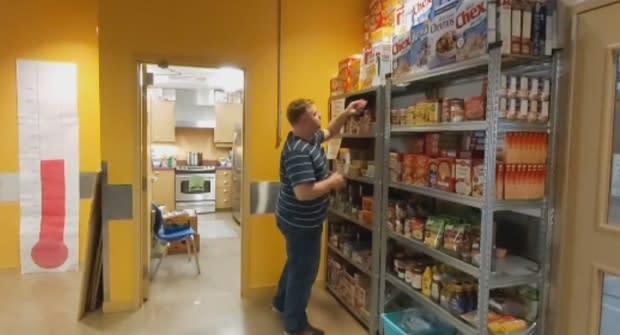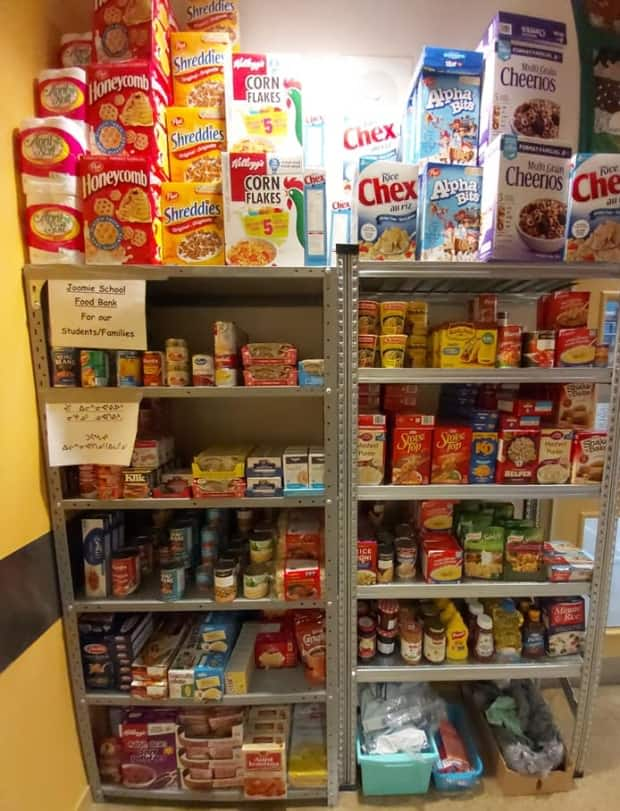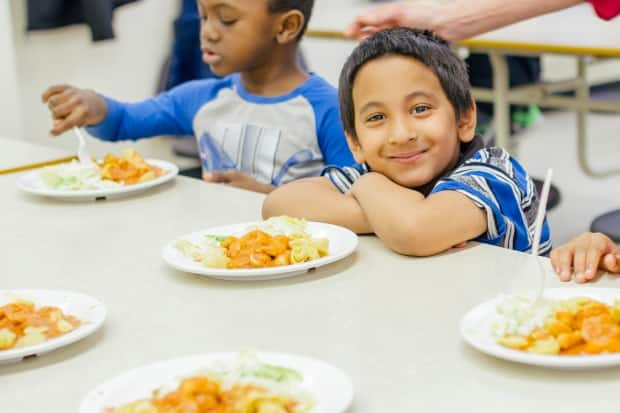School food programs pivot to keep feeding students during COVID-19
For Debora Dibenh, school this fall is certainly a different experience from last year. She's happy to be physically back in class studying favourite subjects such as math and science and grateful for another element of school life that has returned: the food program.
"Sometimes, you are in a rush in the morning ... It's good to know that there's always going to be food here for you," said the Toronto eighth-grader.
There can be myriad reasons why kids might not eat breakfast at home, but being able to count on healthy food at school — cheese and crackers or an orange, for instance — "makes a difference," said parent Leticia Jolampong.
Jolampong is one of the volunteers prepping a daily, mid-morning snack for Dibenh and 450 other students attending Our Lady of Lourdes Catholic School. Amid the coronavirus pandemic, they've made many changes. For example, volunteers now work wearing masks and face shields, apples and other fruits are washed but left uncut and snacks are packaged in paper bags.

Principal Robert D'Addario says the program is crucial.
"When students aren't safe, they're not learning," he said. "The same goes for nutrition. If they're not fed and they're hungry, they're not going to be learning. It doesn't matter what socio-economic background any of the families come from ... Having healthy snacks, that supports all learners."
Prior to the pandemic, two million children a day headed to school and had either breakfast, a mid-morning snack or lunch through a school food program, according to Debbie Field, co-ordinator of the Montreal-based Coalition for Healthy School Food.
However, along with drastically changing the classroom experience, COVID-19 has affected how these programs are being delivered across the country.
Survey found close to 15% of households food insecure
Recent research by a Toronto-based policy group found that 12.7 per cent of households in Canada (about 4.4 million people) experienced some level of food insecurity — meaning a lack of access to enough safe and nutritious food — in 2017 and 2018, including more than 1.2 million children under the age of 18.
A Statistics Canada examination of the subject this past May found COVID-19 is already having an impact, with 14.6 per cent of survey respondents indicating they live in a household that experienced food insecurity in the previous 30 days.
"The [federal] government is investing in money to kick-start the economy. The government is talking very importantly about measures to defend and protect families who may be recently unemployed. They're talking about equity measures like a national child care program for working women. There is no single policy measure like a national school food program to meet all these social needs," said Field.
"A school food program doesn't replace adequate wages or adequate social assistance, but it's one support to working families."
No national food program
Field praises the "incredible resilience" of the community-based groups delivering Canadian school food programs. When schools shuttered this spring, most immediately pivoted to sending food to students at home, she said, while many adapted to support families through food boxes or grocery gift cards as well.

However, the fact that Canada is the only G7 country without a national school food program means that the current patchwork of program providers in each jurisdiction must now struggle with how to continue operations amid COVID-19, said Field, who is also affiliated with the Centre for Studies in Food Security at Ryerson University in Toronto.
Among the issues to consider is how food programs can support students who are learning or in isolation at home.
"We began to see the problem where each jurisdiction, each ministry of education, each ministry of health, each medical officer of health, each school is literally making decisions one by one," she said. "That means children are suffering. Children who would have walked into school to have a mid-morning snack aren't having the same access that they had last year."
'Making sure our kids get fed'
School reopenings in Nunavut have brought some normalcy back for Jason Rochon and the students at Joamie Ilinniarvik School in Iqaluit. After a whirlwind spring and summer spearheading a citywide, breakfast-in-a-bag program that saw volunteers assemble and distribute 19,300 free meals, as well as efforts handing out cartons of free groceries, he's now back as a student support worker and running the breakfast program at Joamie.
He's also restocking its food bank, which was depleted when he sent about 120 bags of food home with kids when Canadian schools shut down in March.

"We've done a such great job so far of keeping COVID out of the territory," Rochon said. "We've been working really hard to be proactive to keep our children as safe as possible."
Though he hasn't had to change much about his in-class breakfast program, pandemic rules limiting in-school visitors means Rochon must rethink how to garner fresh donations for the school food bank. The annual Halloween fun night, Christmas concert or report card day — when parents would usually drop off donations of non-perishable goods — are all out. Instead, he's trying to source monthly sponsors, with a few local businesses stepping up or expressing interest so far.

"I'm just looking forward to those conversations and making sure our kids get fed," said Rochon, who estimates he spends about 10-15 hours a week, outside of his regular work hours, on the food bank.
"I just really believe children shouldn't go to bed at the end of the day hungry."
'Tried, tested and true'
Newfoundland and Labrador's School Lunch Association, which continues to add locations after more than 30 years of operation, is also slowly getting used to a new normal amid COVID.
In the spring, it landed a major logistical win when it managed to gather up all the food left at its various kitchens once schools closed and, with those supplies, establish "a mini Costco" — complete with online ordering system — that supported about 20 community groups, food banks, homeless shelters and other service organizations aiding vulnerable people, said John Finn, executive director of the registered charitable organization.
After that, his team spent a good chunk of the summer consulting on school reopening plans and brainstorming how to adapt their pay-what-you-can hot lunch program, which last year served about 6,300 meals daily across approximately three dozen schools.

The long-running service, which depends on support from donations by businesses and non-profit groups, also helped inspire the new lunch program introduced in Prince Edward Island this fall.
The School Lunch team convinced officials that sticking with their existing program and not jumping to a new model of individually prepackaged takeaway meals was more prudent from the standpoints of cost, nutrition and environmental concerns.
They also committed to creating delivery plans following pandemic protocols (such as increased sanitation, PPE and physical distancing) that would work for every school.
"The service delivery model ... it varies vastly from every school," said Finn. "We've had to get creative with some new equipment."
The team has had to also introduce a new online payment system, expand the team and extend hours for existing staff, he said.
Apart from a dropped tray here or there, things are going well, he said, and for many students, not much has changed. They still queue in lunch lines (albeit now with more space between them and in cohorts), retrieve the same trays they're used to and return to class to eat.
"At the end of the day, your child still sits down to the same hot, nutritious lunch," Finn said.
An adaptable solution
The pandemic interrupted the first year of a new school food initiative for Montreal-based La Cantine pour tous, which oversees more than two dozen community groups and non-profit food producers preparing healthy, affordable meals in Quebec — including for over 50 schools.
"Food security organizations were totally overwhelmed [when COVID hit] because demand skyrocketed," said executive director Thibaud Liné.
His team helped redistribute resources and funding after some groups lost their clientele when schools shuttered and others saw sudden, overwhelming demand for their services. La Cantine also aided new initiatives, such as the distribution of food baskets and frozen prepared meals to families in need.

It adapted its model this fall to deliver individually packaged meals to schools, with teachers and other school staff distributing them to students. Unfortunately, the pandemic has stalled plans to expand La Cantine's hot lunch program.
In the meantime, however, the group has shifted toward anticipating possible school shutdowns to come.
The home-delivery idea born earlier in the pandemic, combined with the fact that positive coronavirus cases have already closed individual schools for two-week stretches this fall, has inspired La Cantine pour tous to plan for further school interruptions. The team is looking at how it can quickly pivot from producing school lunches to creating healthy frozen meals that can be delivered right to families, who will be able to place orders online if there's an extended, widespread school closure again.
"We're trying to think of the most adaptable solution, so that no matter what happens, we'll be able to do something," Liné said.
If it works, the plan could potentially also support other vulnerable communities, such as seniors living alone or those relying on social supports.

What's next is testing the technology and publicizing the program.
"We want to be a bit more organized and a bit more efficient to be able to reach out to even more people than we did six months ago," Liné said.
Food has not historically been a priority in Canada's schools, Liné says, but since the pandemic began, people are realizing that food security is an important issue, especially for students.
"Everyone should have access to education, right? Because it's key," he said. "But if you want to be able to succeed in life, education alone is not enough. You need to eat ... Eating and education should be a collective effort."

